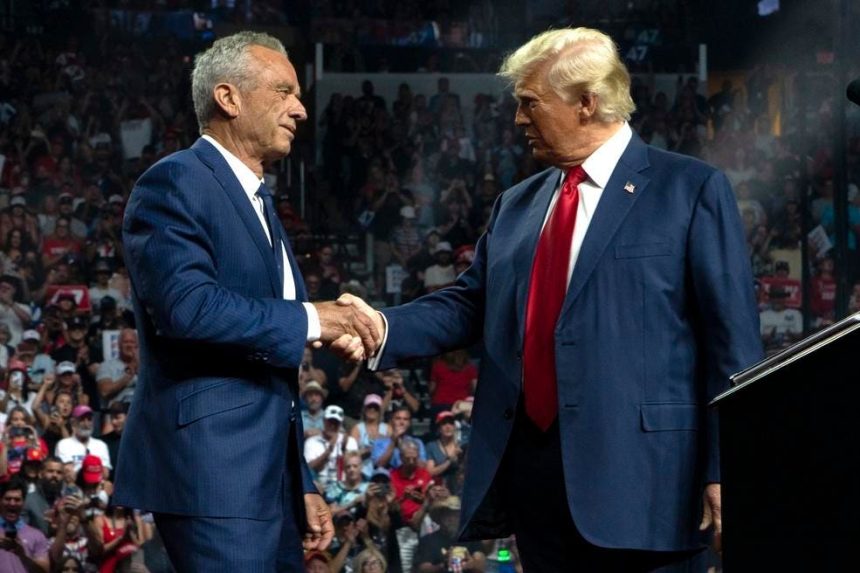Robert F. Kennedy Jr.’s recent statements regarding the U.S. Food and Drug Administration (FDA) hint at a significant shift in public health policy under the upcoming administration of President-elect Trump. Kennedy, who has been nominated as the Secretary of the Department of Health and Human Services (HHS), criticized the FDA’s alleged corruption and bolstered the Make America Healthy Again (MAHA) movement, which seeks to foster independence between public health sectors and pharmaceutical or food industries. This movement has raised concerns over the so-called “revolving door” phenomenon, where pharmaceutical companies hire former FDA officials who once oversaw drug approvals. Kennedy’s mission appears to focus on restoring a high standard of scientific integrity within health agencies, suggesting a desire to overhaul existing drug review processes that some, including Kennedy, believe have strayed from their original purpose.
The implications of Kennedy’s proposed policies raise important questions regarding the future of the FDA’s drug review process. Specifically, there is speculation about whether this administration might retreat from regulatory reforms established over the last few decades. For instance, the accelerated approval process, which allows for faster marketing of certain drugs based on predictive surrogate endpoints, may face significant reevaluation. Furthermore, emergency use authorizations, extensively utilized during the COVID-19 pandemic for expeditious vaccine deployment, could also be on the chopping block. Kennedy seems to advocate for the traditional model, where at least two randomized controlled trials (RCTs) would be mandatory for drug approval—referring to RCTs as the “gold standard” of medical evidence. While high standards for drug approvals are vital, the potential pressure to revert to stricter regulations may hinder rapid access to necessary treatments, particularly in cases of pressing medical needs.
Interestingly, Kennedy has himself expressed support for a variety of alternative therapies and treatments lacking robust RCT evidence, such as psychedelics and certain nutraceuticals. In his public remarks, he has criticized the FDA for allegedly suppressing these types of health interventions. This presents a paradox, as Kennedy’s call for strict adherence to RCT-based evidence coexists with his endorsements of treatments that do not meet these same rigorous standards. To navigate these inconsistencies, Kennedy’s administration may focus on redefining what constitutes acceptable evidence in the evaluation of health therapies. His espousal of a broader range of treatment options reflects a willingness to explore areas outside conventional pharmacology, signaling a possible shift in how health guidelines could evolve under his leadership.
Marty Makary, nominated to head the FDA, shares Kennedy’s critical stance on the current healthcare landscape in the United States. Together, they aim to address what they term the “Childhood Chronic Disease Epidemic,” focusing on factors such as chemical exposures in food and drug safety for younger populations. Makary has built a reputation for questioning established medical practices and advocating for a reassessment of America’s heavy reliance on pharmaceutical solutions, suggesting that many Americans partake in unnecessary medications. His commentary on drug reliance underscores a growing sentiment that the healthcare system needs to shift toward preventive care rather than solely remedial treatment. As a potential FDA commissioner under Kennedy’s direction, Makary might seek to initiate profound changes within the agency, especially concerning apparent linkages between healthcare providers and the pharmaceutical industry.
The Prescription Drug User Fee Act (PDUFA) is poised to be a point of contention between Kennedy, Makary, and legislative bodies. This act, which provides FDA with funds from pharmaceutical companies to facilitate an efficient drug review process, was designed to reduce lengthy approval times that historically plagued the system. Both Kennedy and Makary have expressed disdain toward PDUFA, which may lead them to push for reforms that could significantly alter how drug approvals are conducted and financed. Any substantial changes to or the repeal of PDUFA would require Congressional action, but both nominees appear eager to recalibrate the balance of power and resources, striving to minimize dependency on the pharmaceutical industry. The consequences of such a reform could inadvertently elongate the timeline for new drug approvals, reintroducing complexity previously tackled by PDUFA.
Since its inception, PDUFA has transformed the FDA’s operational framework, contributing significantly to the timely launch of new drugs in the U.S. For many years, U.S. patients were at a disadvantage due to delays in drug approvals compared to their counterparts in other countries. The passage of PDUFA marked a paradigm shift, allowing the FDA to expedite these processes. This led to the U.S. establishing a comparative advantage, often being the first country to introduce new therapies. Thus far, it is estimated that 64% of drugs developed for the U.S. market became accessible before reaching Europe, reinforcing the FDA’s reputation as a leading regulator on a global scale. However, with Kennedy and Makary at the helm, the need to balance efficiency with a more streamlined, less corrupt system seems to be a major objective, despite the potential risks involved in such significant overhauls of a system that is already yielding results.
Ultimately, the transition of the FDA under Kennedy and Makary’s potential leadership represents a critical crossroads for public health policy in the United States. Their focus on reassessing integrity and efficacy within the FDA underscores a broader national conversation about the regulatory framework of healthcare and the extent to which industry influence should be tolerated. While their proposed changes may aim to prioritize transparency and prioritize public health, they risk unintentionally stifling innovation and delaying access to life-saving medications. Given the vital role that the FDA plays in ensuring the safety and availability of pharmaceuticals, any steps taken must carefully consider the delicate equilibrium between oversight and efficiency. The path ahead will undoubtedly shape the future of American healthcare and possibly prompt broader discussions on the relationships between industry, government, and public health interests.



